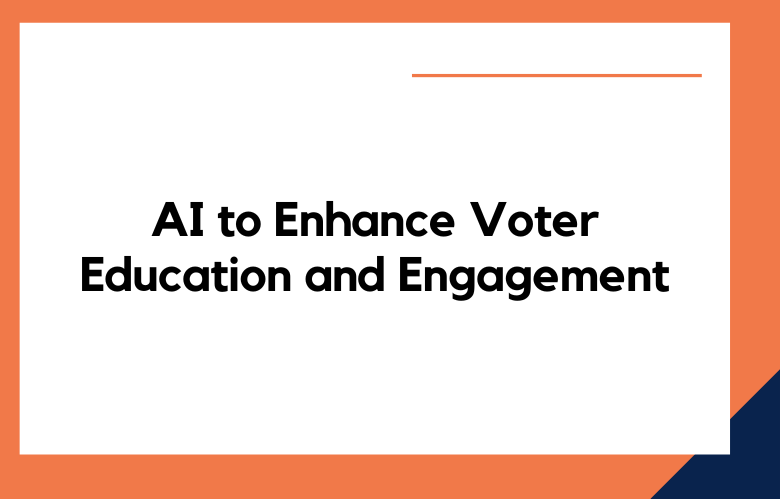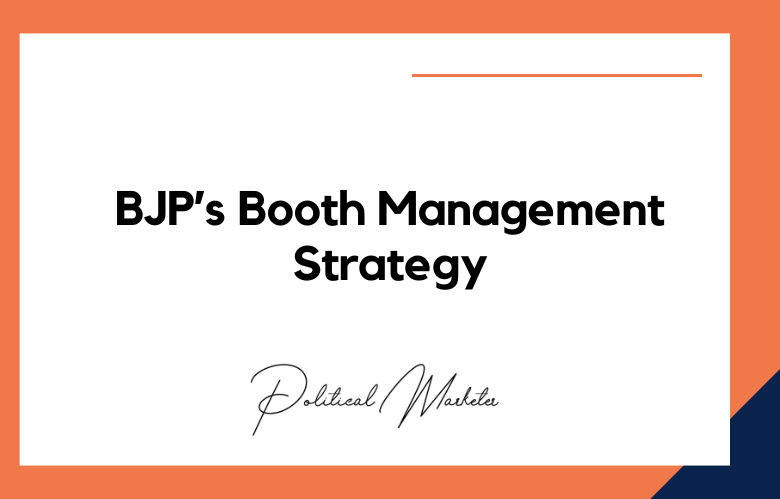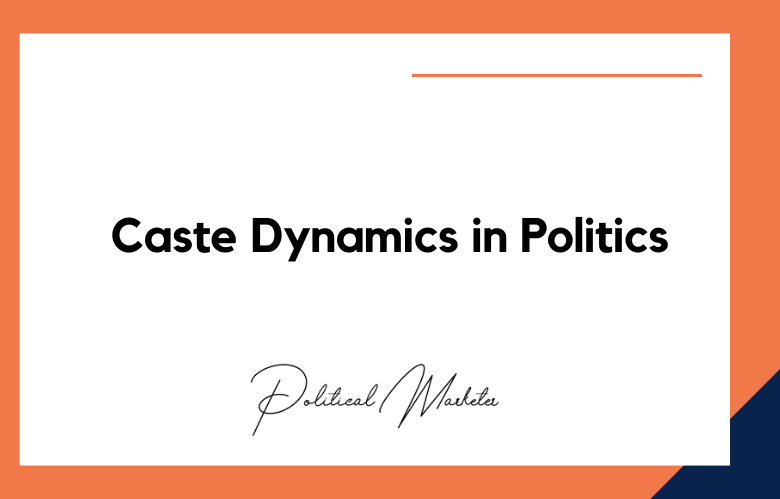With the growth of technology, several industries, including politics, have adopted technological advancements to enhance their processes and engage with their audience. Artificial intelligence (AI) is one such technology that significantly impacts voter education and engagement.
Voter engagement is an essential aspect of democracy, and using AI can help provide necessary information to voters, increase their engagement, and ensure that every vote counts. Outlines some ways AI can enhance voter education and engagement.
Chatbots for Voter Education
Chatbots are intelligent software programs that can simulate conversations with humans using natural language processing technologies. They can be incorporated into websites and social media platforms to answer voters’ frequently asked questions (FAQs).
Chatbots allow voters to access reliable information and help them understand complex issues surrounding political campaigns. For instance, chatbots can provide information on voting registration deadlines, details on whether voters are eligible to vote, and polling locations. Chatbots can also provide customized information to voters based on their site, age, and other demographics.
Personalized political ads using AI
Personalization is a crucial aspect of voter engagement. Artificial intelligence can provide personalized political ads to voters with customized messaging based on their voting history, interests, and social activities.
AI can analyze data points such as social media activity, age, location, and voting history to create accurate and effective messaging that targets specific voters. This approach increases voters’ engagement and encourages voter turnout on election day.
Predictive Analytics for Voter Engagement
Predictive analytics uses AI to analyze data and provide insights into voter behavior. It can help election campaigns understand voters’ preferences, patterns, and the issues that matter to voters.
With this data, election campaigns can customize their messaging to meet the electorate’s needs. Predictive analytics can also identify voters most likely to vote for a particular candidate, which can help campaigns allocate resources more effectively and target their campaigns to reach these voters.
Virtual Reality (VR) for voter education
Virtual Reality (VR) provides a unique experience for voters and can be used to educate voters on critical political issues. VR allows voters to experience complex concepts and problems visually engagingly, making them more understandable.
For example, VR can simulate voting booths that provide training on using electronic voting machines. VR simulations can also give the voters a virtual tour of a polling station, which can help them understand the voting process and provide greater confidence when they cast their votes.
Social Media outreach and analysis
Social media is an essential platform for political campaigns to engage with voters effectively. With the help of AI, political campaigns can analyze social media data to gain insight into what topics are trending, what issues resonate most with voters, and what messages are most effective.
This data can be used to create more informed and effective messaging for voters. Social media platforms can use AI tools to identify and remove fake accounts and misinformation about election campaigns.
Revolutionizing Democracy: Harnessing AI for Voter Education and Engagement
The advancement of artificial intelligence (AI) has brought about limitless possibilities in revolutionizing various industries and sectors globally. In recent years, there has been growing interest in harnessing AI technology to drive voter education and engagement, particularly during elections.
The traditional approach to voter education has been through conventional means, like canvassing, flyers, and TV commercials. While these methods have been effective in some instances, they tend to be tedious and costly and often fail to target the younger generation, who are more inclined to go online for information.
AI for a Better Democracy: Empowering Voters through Education
As we approach the digital age, it is becoming increasingly important to bridge the gap between citizens and the democratic process. One of the most crucial ways to achieve this is through adequate education on election procedures, the significance of voting, and the impact of public policies.
A lack of such knowledge can lead to voter apathy and complacency and even perpetuate biased and ineffective governance. Artificial Intelligence-based solutions can serve as a powerful tool in empowering voters by mitigating these issues and encouraging informed decision-making.
An AI system can provide accessible and customized voter education to diverse communities, including those with language barriers, disabilities, or limited internet access.
By analyzing voters’ past behavior and preferences, algorithms can create personalized lesson plans that meet their unique needs. AI-powered chatbots and virtual assistants can provide instant support and answer voters’ queries regarding registration, absentee ballots, and early voting.
The Future of Voter Education: AI’s Role in Increasing Engagement
As technology advances, artificial intelligence (AI) increasingly plays a significant role in shaping different aspects of society. In particular, AI is revolutionizing voter education and engagement, especially during election cycles.
Traditional voter education methods, such as TV ads, print materials, and canvassing, have needed to be more efficient in reaching and engaging voters, especially millennials and Generation Z. However, as many as 2.8 billion people use social media platforms, providing an excellent opportunity for AI-driven voter education to revolutionize how people access and engage with civic information.
One significant way AI is revolutionizing voter education is through personalized recommendations. AI tools can understand and analyze vast amounts of voter data, such as voting history, demographics, and location data, to create customized content for each user. These recommendations provide voters with specific information and tailored messages that align with their interests, increasing voter engagement and trust in the voting process.
Democratizing Information: Using AI to Drive Voter Education and Engagement
Democratizing information has been a crucial aspect of modern society, and the use of Artificial Intelligence (AI) plays a pivotal role in this pursuit. In particular, AI is now being utilized to drive voter education and engagement, an initiative that can potentially transform the political landscape.
With people’s increasing reliance on smartphones and other mobile devices, AI-powered apps are at the forefront of providing swift and convenient access to accurate political information. For instance, AI-powered chatbots are becoming prevalent in informing citizens about relevant political topics.
These chatbots can respond to queries and provide insightful information on candidates, policies, and other political matters. Moreover, AI-powered applications can personalize political news feeds to cater to individual preferences, enhancing users’ engagement and interest in the electoral process.
From Awareness to Activism: Leveraging AI for Voter Education and Engagement
As we approach the upcoming election, we must acknowledge voter education and engagement’s critical role in the democratic process. Artificial Intelligence (AI) advancements have provided new avenues for organizations to reach out to and educate voters in recent years. AI-powered tools effectively engage voters, increasing their awareness and participation in the democratic process.
AI-enabled voter education and engagement tools provide insights into critical issues that matter to voters. These tools help voters understand political concepts and platforms in a non-partisan way. They also enable voters to access personalized voter recommendations, specific candidate information, and ballot measures.
Breaking Barriers: How AI Can Enhance Voter Education and Engagement
In recent years, there have been growing concerns regarding voter engagement in democratic societies. Despite technological advancements, low voter turnout and apathy continue to plague many countries, with most voters feeling neglected and disinterested in the electoral process. However, artificial intelligence (AI) can change this trend and enhance voter education and engagement.
AI can revolutionize election-related education by providing personalized and targeted information through various channels, including social media, online platforms, and mobile apps. With AI, voters can receive information tailored to their unique interests and needs based on their voting history, geographic location, and other relevant factors. Furthermore, AI can help address the problem of voter disinformation by analyzing complex data sets and providing unbiased facts to the public.
The Power of Knowledge: AI’s Impact on Voter Education and Engagement
As technological advancements continue to grow, the application of AI in various industries and sectors has become increasingly prevalent. One area in which AI has demonstrated its potential is in the field of voter education and engagement.
Voting is a crucial component of democracy. However, many individuals need to be more engaged in the political process due to a lack of understanding or apathy. This is where AI can be a valuable tool in bridging the gap between citizens and the voting process.
AI can analyze vast amounts of information, including voter preferences and demographics, to provide customized and targeted messages to voters. This can include reminders to register to vote or information on specific candidates and their platforms. By tailoring the messaging, AI can effectively reach out to voters who may otherwise be left out of the political discourse.
Intelligent Voting: Utilizing AI to Educate and Engage Voters
Intelligent voting is a revolutionary approach to voting that utilizes artificial intelligence (AI) in educating and engaging voters. With the advent of technology, AI has emerged as a disruptive force with the potential to transform how we vote.
One of the key benefits of intelligent voting is the ability to educate voters on various political issues. Through AI-powered chatbots, voters can receive tailored information on candidates’ stances on issues that matter most to them. This can lead to informed decision-making, helping voters make choices that align with their values and interests.
Conclusion:
Undoubtedly, AI has great potential to enhance voter education and engagement. From chatbots providing personalized information to voters to using VR to simulate voting booths, AI can play a critical role in increasing voter participation and turnout.
AI can also help campaigns better understand voters’ preferences and deploy resources effectively. In summary, AI presents opportunities for political campaigns to engage voters on a level previously unmatched. AI can be used to provide more customized and effective messaging to voters, ultimately strengthening democracy and empowering citizens to vote.
Call: +91 9848321284
Email: [email protected]
How to Use AI to Enhance Voter Education and Engagement: FAQs
What Is The Role Of AI In Voter Education?
AI can deliver personalized, timely, and accessible information to voters about candidates, policies, and voting procedures.
How Can AI Improve Voter Engagement?
AI tools such as chatbots, predictive analytics, and personalized content distribution help keep voters informed and emotionally connected to the campaign.
Can AI Help First-Time Voters Understand The Voting Process?
Yes, AI-powered guides and conversational agents can explain registration, ballot structure, and polling station details in user-friendly formats.
What Types Of AI Tools Are Used In Voter Education?
Tools include chatbots, NLP-driven Q&A systems, AI content generators, voice assistants, and recommendation engines.
How Does AI Personalize Voter Communication?
AI segments voters by behavior, interest, and demographics to deliver tailored messages that resonate with their unique concerns and priorities.
Is AI Capable Of Answering Voter Questions In Real-Time?
Yes, AI chatbots can be trained to respond to FAQs about policies, candidates, and election logistics 24/7.
How Does AI Support Multilingual Voter Outreach?
AI can translate and localize content into regional languages, expanding accessibility and inclusion for diverse voter bases.
Can AI Identify Voter Sentiment And Engagement Levels?
Yes, sentiment analysis algorithms evaluate social media, emails, and chat responses to gauge voter mood and adjust outreach accordingly.
Does AI Enhance Fact-Checking And Combat Misinformation?
AI can scan content for misleading claims, detect disinformation, and suggest verified sources to voters in real time.
How Is AI Used To Deliver Civic Education Content?
AI curates and pushes civic education videos, quizzes, and explainers based on a voter’s learning preference and knowledge gaps.
What Role Do AI-Powered Surveys Play In Engagement?
AI-enhanced surveys can adjust dynamically to voter responses, making them more relevant and increasing participation rates.
How Can Political Campaigns Use AI To Build Trust With Voters?
By using AI transparently to educate rather than manipulate, campaigns can foster trust through helpful and consistent voter support.
Can AI Assist Visually Or Hearing-Impaired Voters?
Yes, AI can generate accessible content using voice synthesis, screen readers, image recognition, and closed captions.
What Is The Ethical Use Of AI In Voter Education?
Ethical use involves transparency, data privacy, non-partisanship, and a clear focus on informing voters rather than persuading deceptively.
Is AI Being Used In Voter Reminder Campaigns?
Yes, AI systems schedule and automate reminders via SMS, email, or voice calls about voting dates, locations, and deadlines.
How Can AI Improve Voter Registration Drives?
AI can identify unregistered voters, send personalized nudges, and guide them through the registration process step by step.
Can AI Simulate Policy Impacts To Help Voter Understanding?
Yes, AI models can simulate how policies might impact different communities, helping voters make informed decisions.
Does AI Reduce The Digital Divide In Voter Education?
AI-powered tools optimized for mobile, low bandwidth, and multilingual use can help bridge the gap for underserved populations.
How Is AI Used In Gamifying Voter Education?
AI helps create interactive learning experiences like quizzes, simulations, and games that educate while engaging voters.
Can AI Strengthen Youth Voter Engagement?
Yes, AI enables campaigns to reach younger audiences on platforms they use with content tailored to their interests and civic concerns.











